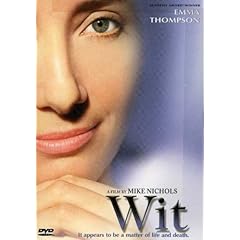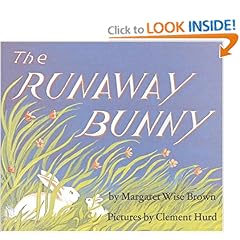On a Friday night in February (during my blog break) while my ten year old daughter, Betsy-Bee was celebrating her birthday with a bevy of giggling friends in the living room watching Princess Diaries II, I watched the movie Wit in my bedroom, mostly alone. Wit tells the story of a forty-something college English professor, a specialist in the poetry of John Donne, who is told that she has stage-4 ovarian cancer. As Professor VIvian Bearing tells us later, in an aside, there is no stage-5.
 Much of the movie, based on a play by Margaret Edson, is made up of the monologue narration of Ms. Bearing, as she tells the viewer of the indignities, pain and suffering that make up her journey through chemotherapy and cancer and eventually into death. As you can imagine, there are many poignant asides and scenes that are quite difficult to watch. Actress Emma Thompson plays the part of Vivian Bearing, and she is amazing. Engineer Husband saw pieces of the movie as he came in and out of our room, and he said she deserved an Academy Award. I agree.
Much of the movie, based on a play by Margaret Edson, is made up of the monologue narration of Ms. Bearing, as she tells the viewer of the indignities, pain and suffering that make up her journey through chemotherapy and cancer and eventually into death. As you can imagine, there are many poignant asides and scenes that are quite difficult to watch. Actress Emma Thompson plays the part of Vivian Bearing, and she is amazing. Engineer Husband saw pieces of the movie as he came in and out of our room, and he said she deserved an Academy Award. I agree.
The movie itself, especially Ms. Thompson’s performance, which really was the movie, was morbidly fascinating and difficult to watch. The way that Ms. Bearing interacted with the poetry of John Donne in her struggle with death and dying made the movie a rich and thoughtful experience. It’s rated PG-13 for “thematic elements”, and I would agree that it’s not for the young and/or faint of heart.
DEATH be not proud, though some have called thee
Mighty and dreadfull, for, thou art not so,
For, those, whom thou think’st, thou dost overthrow,
Die not, poore death, nor yet canst thou kill me.
From rest and sleepe, which but thy pictures bee,
Much pleasure, then from thee, much more must flow,
And soonest our best men with thee doe goe,
Rest of their bones, and soules deliverie.
Thou art slave to Fate, Chance, kings, and desperate men,
And dost with poyson, warre, and sicknesse dwell,
And poppie, or charmes can make us sleepe as well,
And better then thy stroake; why swell’st thou then;
One short sleepe past, wee wake eternally,
And death shall be no more; death, thou shalt die.
~John Donne, 1572-1631
 After I watched the movie and put the birthday partiers to sleep with threats and charms and poppies, I picked up a small book from my library basket, a novella really, The End of the Alphabet by C.S. Richardson. Coincidentally, serendipitously, it was a book about death and dying. Ambrose Zephyr, the protagonist of the novella, is told that he has a rare and incurable illness and only one month to live, “give or take a day.”As she was dying, Professor Bearing travelled through examination rooms, and hospital waiting areas, and X-rays and chemotherapy; Ambrose Zephyr decides to go on a literal journey, along with his wife, Zappora Ashkinazi, to an alphabetical list of meaningful places.
After I watched the movie and put the birthday partiers to sleep with threats and charms and poppies, I picked up a small book from my library basket, a novella really, The End of the Alphabet by C.S. Richardson. Coincidentally, serendipitously, it was a book about death and dying. Ambrose Zephyr, the protagonist of the novella, is told that he has a rare and incurable illness and only one month to live, “give or take a day.”As she was dying, Professor Bearing travelled through examination rooms, and hospital waiting areas, and X-rays and chemotherapy; Ambrose Zephyr decides to go on a literal journey, along with his wife, Zappora Ashkinazi, to an alphabetical list of meaningful places.
A is for Amsterdam.
B is for Berlin.
C is for Chartres, etc.
As the couple visit each place, Ambrose becomes more ill, more distant and withdrawn, and more desperate. Zappora, nicknamed Zipper, tries to travel with her husband on his dying journey, but it’s not something easily shared.
Ambrose: “So what? So there it is. Here I am. There’s nothing to deal with. If there were I would do it. But there isn’t and I am terrified and this isn’t happening to you.”
Zipper: “You selfish, silent, sh—, bastard. This is happening to me.”
Ambrose: “Really? In less than a month, you’ll still be alive.”
Zipper: “Really. I can hardly wait. Lying in on Sundays? At last. A decent cup of tea? Brilliant. No more squinting, no more imagination, no more silence? I can hardly f— wait.”
Zipper Ashkenazi and Ambrose Zephyr believe in each other, in communication and shared experience and in love. Zipper is left in the end with silence and her own words echoing off the pages of her journal, “This story is unlikely.” In fact, death is the most likely story of all. It is appointed unto man once to die, and after that the judgement.
 Dr. Vivian Bearing believes in her own strength and stoicism, and when that is stripped away from her by her illness, she is left with the poetry of John Donne. She clings, not to God himself, but to Donne’s faith in God, and finally Donne’s conceits and paradoxes are empty for her, too. Her elderly mentor reads to her, not Donne, but rather the elegantly simple picture book, The Runaway Bunny by Margaret Wise Brown. I wonder if one can commit one’s soul to God mediated through the words of a picture book and a seventeenth century poet?
Dr. Vivian Bearing believes in her own strength and stoicism, and when that is stripped away from her by her illness, she is left with the poetry of John Donne. She clings, not to God himself, but to Donne’s faith in God, and finally Donne’s conceits and paradoxes are empty for her, too. Her elderly mentor reads to her, not Donne, but rather the elegantly simple picture book, The Runaway Bunny by Margaret Wise Brown. I wonder if one can commit one’s soul to God mediated through the words of a picture book and a seventeenth century poet?
That question brings me back full circle to Donne, and ultimately to God.
“We have a winding-sheet in our mother’s womb which grows with us from our mother’s conception and we come into the world wound up in that winding-sheet, for we come to seek a grave.”
~John Donne’s sermon, Death’s Duel
Dr. Bearing died trusting, perhaps, in the God of Donne and of the Runaway Bunny. Ambrose Zephyr died at home in bed with his wife nearby, their final separation leading only to an “unlikely story.” How will I die? How will you?
“Our critical day is not the very day of our death, but the whole course of our life . . . God doth not say, Live well, and thou shalt die well, that is, an easy, a quiet death; but live well here, and thou shalt live well forever.”
~ Death’s Duel by John Donne.
I may die laughing or crying or screaming, with a bang or a whimper, but into His hands I commit my spirit. And I believe it to be highly likely that “He is able to keep that which I’ve committed unto Him against that day.”
Excellent review…. made me want to look for the book and the movie…. I already know about The Runaway Bunny 🙂
Beautiful, Sherry! One of your best posts ever, truly!
What a firm foundation we have! Praise God!
I have seen this movie thrice and it’s really good. the scenes are so poignant and overwhelming that i ended up in tears. Seeing Ms. Bearing have to undergo all that suffering and the chemotherapy, I really empathize with all the cancer patients and survivors out there. I really really love this movie.
Sherry, I find your blog on a search for children’s book reviews form a Christian perspective, This wonderful posts reminds me how very important that perspective is. Thank you!
I watched Wit once, and I have told people it is the best movie I have ever seen that I never want to see again. It was a long time after watching that movie that I could read The Tale of the Flopsy Bunnies without crying. I couldn’t even say the word soporific.
Pingback: Poetry Friday: More John Donne at Semicolon
I really liked The End of the Alphabet!
Hi Sherry, By weird coincidence I watched this movie last week. As you said, Emma Thompson was outstanding. The script was good too. Yet it was SO depressing watching someone die alone and without hope. I cried buckets.
I’ve never heard of Wit. After reading this, I really want to… but will need to prepare myself.
Thanks for the excellent review(s).
Pingback: Saturday Review of Books: May 16, 2009 at Semicolon
The death really was what captured me about the play/movie, and not just my own. I have a family. I just was/am so touched by the fact that Vivian Bearing was so alone. How I want to reach out to those around me so no one has to go through those last stages of life alone but for their thoughts!
Pingback: Semicolon » Wednesday’s Whatever: Blogiversary
Pingback: The Travel Wish List With Literary Accoutrements | Semicolon
Pingback: Preview of 2011 Book Lists #2 | Semicolon